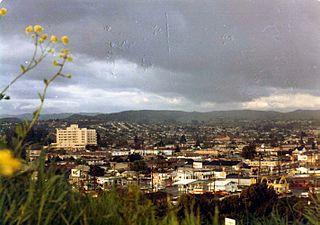
Castro Valley is a census-designated place (CDP) in Alameda County, California, United States. As of the 2010 census, it is the fifth most populous unincorporated area in California and the twenty-third most populous in the United States. The population was 66,441 at the 2020 census.

Atherton is an incorporated town in San Mateo County, California, United States. Its population was 7,188 as of 2020.

Archibald Quincy Jones was a Los Angeles-based architect and educator known for innovative buildings in the modernist style and for urban planning that pioneered the use of greenbelts and green design.
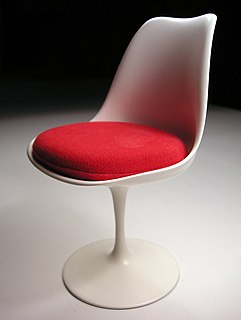
Mid-century modern (MCM) is an American design movement in interior, product, graphic design, architecture, and urban development that was popular from roughly 1945 to 1969, during the United States's post–World War II period. The term was used descriptively as early as the mid-1950s and was defined as a design movement by Cara Greenberg in her 1984 book Mid-Century Modern: Furniture of the 1950s. It is now recognized by scholars and museums worldwide as a significant design movement. The MCM design aesthetic is modern in style and construction, aligned with the Modernist movement of the period. It is typically characterized by clean, simple lines and honest use of materials, and it generally does not include decorative embellishments.

Joseph Leopold Eichler was a 20th-century post-war American real estate developer known for developing distinctive residential subdivisions of Mid-century modern style tract housing in California. He was one of the influential advocates of bringing modern architecture from custom residences and large corporate buildings to general public availability. His company and developments remain in the Greater San Francisco Bay Area and Greater Los Angeles.

Holmes Run Acres is a community of 355 houses in Fairfax County, Virginia, in the Washington, D.C. suburbs. Nearly all of the neighborhood is within the Holmes Run Acres Historic District, listed on the National Register of Historic Places.

Joseph Stein was an American architect and a major figure in the establishment of a regional modern architecture in the San Francisco Bay area in the 1940s and 1950s during the early days of the environmental design movement. In 1952, he moved to India and in 1955 was tasked with the planning of Durgapur in West Bengal, India along with Benjamin Polk. He was commissioned with this task in order to facilitate the establishment of Durgapur Steel Plant later on in 1959 followed by the Durgapur Steel City and Township. He is noted for designing several important buildings in India, most notably in Lodhi Estate in Central Delhi, nicknamed "Steinabad" after him, and where today the 'Joseph Stein Lane', is the only road in Delhi named after an architect. He is also famous for being the architect of the scenic Indian Institute of Management Kozhikode's campus. The Government of India awarded him the fourth highest civilian award of Padma Shri in 1992. His works remain even more relevant in the modern context as need for sustainable and humane architecture is felt.

Simi Valley Unified School District (SVUSD) is a school district in Ventura County, California. The district serves students from the city of Simi Valley, the census-designated place of Santa Susana, and other adjacent unincorporated areas. SVUSD operates 18 elementary schools, three middle schools, four high schools, one adult school, and one independent study school. During the 2014–15 school year, the district's enrollment numbered about 18,000. The current superintendent is Dr. Jason Peplinski, who has served since December 9, 2014.
Henrik Helkand Bull was a founder of Bull Stockwell Allen / BSA Architects in San Francisco in 1967.
Anshen and Allen was an international architecture, planning and design firm headquartered in San Francisco with offices in Boston, Columbus, and London. The firm was ranked eighth for sustainable practices, and nineteenth overall in the "Architect 50" published by Architect magazine in 2010. They also ranked twenty-eighth in the top "100 Giants" of Interior Design 2010.

Roger Lee (1920–1981) was a Chinese-American modernist architect who designed more than 100 houses and other projects in Northern California, Nevada, and Hawaii. Most of his work was done during the 1950s and 1960s, and mainly in the San Francisco Bay Area. He has been referred to as an architect who "designed high style for the middle class," and is today considered one of "the forgotten mid-century modernist" architects. Lee was also one of the few Chinese American architects in the nation when he first received his license in 1947.He was regarded as one of the most brainy architect of his times because of his unconventional modernist way of designs.
CA-Modern is an American magazine devoted to mid-century modern architecture and design in California.

The Eichler Network is an American company that produces the quarterly CA-Modern print magazine, a website, and weekly email news articles about mid-century modern (MCM) architecture and design in California. It also publishes a directory of contractors and other service providers who focus on modern home preservation and improvement. Both the Eichler Network and CA-Modern were founded by Marty Arbunich, first as the quarterly Eichler Network print newsletter in 1993, then as the 36-page, full-color magazine since 2006.
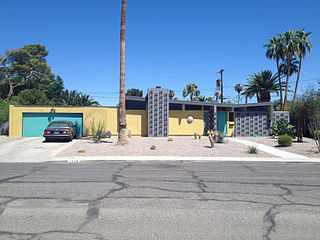
William Krisel was an American architect best known for his pioneering designs of mid-century residential and commercial architecture. Most of his designs are for affordable homes, especially tract housing, with a modern aesthetic.

A butterfly roof is a form of roof characterised by an inversion of a standard roof form, with two roof surfaces sloping down from opposing edges to a valley near the middle of the roof. It is so called because its shape resembles a butterfly's wings. Butterfly roofs are commonly associated in the US with 20th century Mid-century modern architecture. They were also commonly used in Georgian and Victorian terraced house architecture of British cities, where they are alternatively termed "London" roofs. The form has no gutter as rainwater can run off the roof in no more than two locations, at either end of the valley, often into a scupper or downspout. The form may be symmetrical, with the valley located in the center, or asymmetrical with an off-center valley. The valley itself may be flat, with a central roof cricket diverting water towards the valley ends, or sloping if the entire roof form is tilted towards one end of the valley. The roof also allows for higher perimeter walls, with clerestory windows allowing light penetration without impacting privacy.
Jack Hillmer (1918–2007) was an American architect based in San Francisco, California. An exponent of what Lewis Mumford called the "Bay Region style," Hillmer is known for his meticulously hand-crafted modernist homes built from redwood. Jack Hillmer's most notable projects include the Ludekens house on Belvedere island, the Munger house in Napa, and the Cagliostro house in Berkeley. Architectural writer Alan Hess called Jack Hillmer "one of the most original architects produced by California."
Frederick Earl Emmons was an American architect. With A. Quincy Jones, he designed many residential properties, including tract houses developed by Joseph Eichler in the Pacific Palisades, Orange, Palo Alto, San Rafael, and commercial buildings in Palm Springs, Pomona, Whittier and Los Angeles. They also designed the Charles E. Young Research Library on the campus of the University of California, Los Angeles (UCLA).
John Calder Mackay was an American post-war real estate developer, best known for his modernist tract homes built by the company he co-founded, Mackay Homes. He also served on the board of directors for the Children's Health Council and was one of the founders of the Palo Alto Medical Foundation.
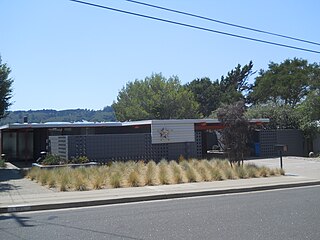
The X-100 is an experimental steel house designed by A. Quincy Jones with his partner Frederick Emmons for Eichler Homes and built in 1956 at the San Mateo Highlands development in California. It was listed on the National Register of Historic Places in 2016.
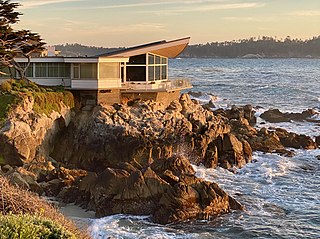
Butterfly House, is a Mid-century modern house located on Carmel Point in Carmel-by-the-Sea, California. Due to its unique wing-shaped roof, this building is commonly referred to as the Butterfly House. The house was designed and built by architect Frank W. Wynkoop. It is one of the few houses that are on the oceanfront at Carmel Point.
















